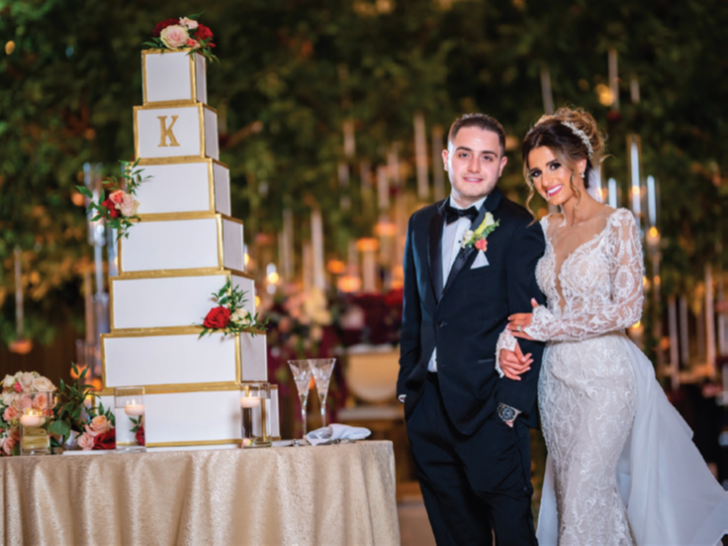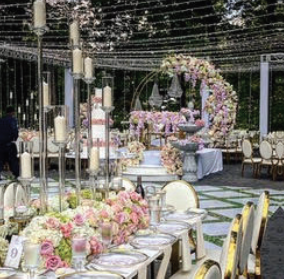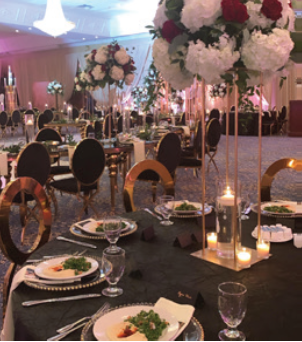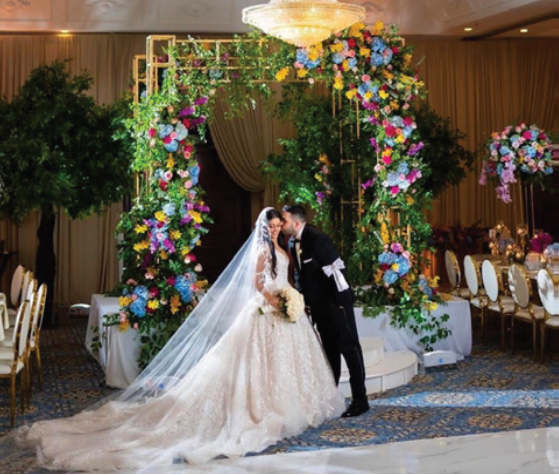Bringing Back Romance: Weddings Require Creativity Amid COVID
By Paul Natinsky
As people adjust to life under COVID, lived at home, outdoors, in small groups, masked and spaced, the pandemic’s effects push into cultural events for many communities. For Chaldean brides and grooms, family and wedding professionals, change has been difficult.
Accustomed to 400- and 500-person gatherings with lavish food, festive music and loads of tradition, the Chaldean community is adjusting to smaller weddings, outdoor and home events, and a backlog of postponed nuptials.
“I started to realize that you don’t have to have a 400- or 500-person wedding to have the wedding of your dreams. You can still have a small, intimate wedding and still have an amazing time,” said Jon Elias, better known as The Pastry Guru.
COVID Inspires Creativity
Elias is sort of a one-man show, making wedding cakes and creating dessert stations. Until early 2020, wedding business took up all of his time. Elias has a degree from culinary school.
He worked at high-end restaurants around Michigan before transitioning to his wedding dessert venture. With wedding business screeching to a halt in 2020, Elias began accepting preorders for holidays, including Father’s Day, Mother’s Day, Christmas and Thanksgiving. He never expected he would have time for such sidelines, but now thinks he will continue with the expanded offerings.
Event Planners Andrew Keina and business partner Lawrence Yaldo turned to “pop-up” events to fill the revenue gap until they can get back to their core wedding-planning activities.
The pair, who connected about fifteen years ago and own Top That Table, teamed with Elias on Mother’s Day to provide flower arrangements with Elias’ cheesecakes.
Keina and Yaldo are no strangers to working beyond weddings. Top That Table takes on a variety of large and small events, including baby showers, first birthday parties and providing seasonal decorations for a West Bloomfield mall for the past decade.
Still, the increase in spontaneous opportunities is a stop-gap measure to pay the bills until large events again become possible.
A Steady Hand
Dalia Attisha found herself working hard to keep a cool head and present a reassuring face to her clients. After finding her calling in event planning through experience with her father’s Chaldean community newspaper, chamber of commerce work and a degree in business and interior design, she spent the past twenty years calming couples and providing expert help to ensure their big day is a great experience.
In 2020, that mission stretched to its limits. “The biggest challenge was that planning one wedding became planning three weddings,” said Attisha. “The date, budget and guestbook would change. The ideas would change in so many different ways. And then, something else would come up. That was the biggest challenge, because as an event planner, people are looking to us for advice, for guidance, and really this was our first pandemic. They’re looking to us for answers and we don’t have answers.”
Attisha likened her 2020 experience to being a flight attendant on an extremely turbulent flight. The first person the passengers look to is the flight attendant, and that person must control their own stress to keep everyone calm.
Event venues and vendors have been compassionate, said Attisha. She said vendors are waiving fees for date changes and cancellations and making deposits transferable, something that, pre-COVID, could have cost a couple as much as $500.
Still, the stress is there for everyone involved in weddings—planners, couples, families. Adding to the tension is the scarcity of dates available in 2021. With restrictions still in place at press time and several months of cold weather ahead, the backlog created in 2020 continues to grow, pushing those who would have married this year to push back to 2022.
Backlogs & Adjustments
Popular wedding venue Regency Manor Banquet Center in Southfield is feeling the effects of that backlog and doesn’t see immediate relief in sight. “The first quarter of 2021 still looks bleak,” said General Manager Jovann Dawood-Mihalian. “No one is really committing to events because of the uncertainties of extended indoor dining restrictions and the increased spread of the virus. Since last year we have been forced to pivot and change our business model multiple times to keep revenue coming in and at least make payroll.”
Dawood-Mihalian is hopeful 2021 will be better after first quarter, but Regency is not taking any chances. “We are optimistic that the second quarter of the year we will begin to rebound. Just in case though, for the balance of 2021, we will be promoting our carry out and off-site catering menu. Our guests love our food and service. If they are not allowed and/or are too uncomfortable to enjoy our food and service indoors, we are hopeful that they will use our services for their private home or outdoor events. COVID-19 has forced every business to deep dive into what they are good at and try to expand on those qualities to survive. This is still a rough time for everyone in the food service industry.”
Government grants and loans helped several of those interviewed get their businesses through 2020, but they mostly helped businesses pay bills for overhead and didn’t come close to replacing lost revenue. There is a lot of anxiety for the Chaldean community regarding nuptials in 2021. Smaller weddings, home and outdoor events will ease some of the stress, but alternatives are not very viable.
“Some people have done the virtual thing, but for our Chaldean community, we’re very social and we need each other. We need to be present with each other. The whole Zoom, Facetime, Skype thing won’t work for us,” said Attisha. Keina, who spoke to me from Florida, said he has discussed “destination” weddings in Florida, where it is warm and restrictions on gatherings are more liberal, but the cost of travel and hotel are prohibitive.
It’s Really About the Couples
In the end analysis, Attisha said weddings are about the couples, the people who are pledging their lives to one another. Families often drive the pomp and circumstance associated with large weddings. The couples just want to be together with those close to them.
Keina recalls a wedding between two people, both of whom were deaf. The pair met at a school for the deaf and many of the guests were deaf friends from school. Many could not hear the music that is such a central part of a Chaldean wedding. “With Chaldean music it’s so energetic and loud, but you could feel their emotions even though they couldn’t hear anything. They would wave their napkins or their hands to signal dancing or clapping,” said Keina. “It was such a beautiful wedding, because you truly, truly felt the love in the air at this wedding.”
In the end, that seems to be the point. The wedding event is really about the love between two people willing to make a lifetime commitment to one another.




